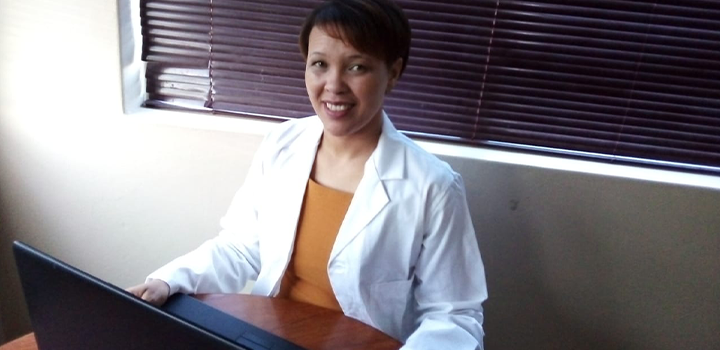Spotlight on the link between HIV and mental health conditions

There are common mental health conditions associated with HIV, but doctors do not always screen patients in mental health units for the virus. Dr Illana Links hopes that her research will help patients in mental health units and in community and HIV clinics.
Depression, psychosis and other HIV-associated neuro-cognitive conditions can have a huge effect on the quality of life of patients in mental health units.
“Many people are unaware of the fact that people with HIV are predisposed to mental disorders such as bipolar depression,” says Dr Illana Links, a 35-year-old registrar in psychiatry at Dora Nginza Hospital in Port Elizabeth.
Dr Links has received a Discovery Foundation Rural Individual Award to research the prevalence and clinical link between mental health and HIV in an acute mental health unit.
A look at interconnected conditions
“I find neuropsychiatry absolutely fascinating, as it is a perfect mixture to me between internal medicine, neurology and psychiatry,” Dr Links says. She laughs when saying she had always wanted to be a doctor. “I had to do an oral presentation in Grade 6 about what I wanted to be when I grew up, and guess what I said?”
Dr Links was born in Kareedouw close to Humansdorp. She went to Paul Sauer High School, and completed her studies in medicine in 2009 at the University of Stellenbosch. She is married, has three children, and is specialising in psychiatry through Walter Sisulu University.
“I am absolutely fascinated by the effects that HIV has on the brain and have been greatly inspired by my supervisor, Dr Yanga Thungana, who is specialising in neuropsychiatry,” she says.
Discovery Foundation alumnus pays it forward
Dr Thungana is no stranger to the Discovery Foundation. In 2017, he received the same award to study the prevalence of substance use in patients with first-episode psychosis. He found strong links between mental illness and high levels of lifetime substance abuse in patients at Dora Nginza’s mental health unit. Today, he is paying it forward by supervising Dr Links.
Dr Links says the Discovery Foundation Awards are renowned for helping those studying medicine, particularly in rural areas, to do the kind of research that will make a difference in the communities they are serving.
“I witnessed how these awards opened doors for some of my colleagues in the past, and how it enabled them to do so much more with their research projects without having to worry about the funding,” she adds.
The benefits of finding psychiatric conditions early
Worldwide, 38 million people were living with HIV in 2019, while 75.7 million people have become infected with HIV since the start of the COVID-19 pandemic, according to the United Nations. Dr Links hopes that her research will help patients in mental health units and in community and HIV clinics get the proper care they need. Her research strongly aligns with the UN’s sustainable development goal to ensure healthy lives and promote wellbeing for all at all ages, as does Discovery’s core purpose.
She wants to help remind and sensitise doctors and nurses to screen for HIV in people with mental health conditions, and to look out for mental health conditions in people with HIV. She explains that untreated HIV infection can have negative effects on the outcome of mental conditions, while untreated mental illness can affect the health outcomes of people with HIV.
Furthermore, HIV can predispose patients to the effects of depression, psychosis and the ageing of the brain. Many young people who are born with HIV can also present early with these psychiatric conditions. This often manifests as emotional, behavioural, and cognitive difficulties much earlier than in peers not living with HIV.
Dr Links says there are key links between mental health conditions and HIV. “Early intervention is beneficial in patients with HIV or mental illness.”
Her research also focuses on the prevalence of HIV in mental health units, and the full range of the common mental health conditions associated with HIV. The Discovery Foundation Rural Individual Award will help her to complete her research project for her MMed degree, and to qualify as a psychiatrist.
About the Discovery Foundation
Since 2006, the Discovery Foundation has invested over R256 million in grants to support academic medicine through research, development and training medical specialists in South Africa.
The Discovery Foundation is an independent trust with a clear focus – to strengthen the healthcare system – by making sure that more people have access to specialised healthcare services. Each year, the Discovery Foundation gives five different awards to outstanding individual and institutional awardees in the public healthcare sector.
Related articles

Vitamin deficiency evidence – a likely gamechanger in mental health
Megan Schultz’s research on the nutritional state of mentally ill patients could significantly improve the lives of many people, especially if bolstered by evidence-based policies and changes in nutrition-related laws.

Easing the mental health hardships of rural mothering
Dr Nokwazi Mtshengu’s Discovery Fellowship Award is helping her translate to isiXhosa a globally accredited psychiatric tool to assess postpartum depression, which will benefit depressed mothers, the infant, family and broader community.

Eastern Cape doctor receives Discovery Foundation Award to research catatonia
Psychiatric registrar Dr Carmenita Groves says her analysis of arguably the largest cohort of patients diagnosed with catatonia in South Africa, observing their presentation, management and outcomes, is already boosting referrals at Dora Nginza Hospital.